Ata-ul-Haye Nasir, Ahmadiyya Archive & Research Centre
Introduction of the Wavell Plan
Field Marshal Archibald Percival Wavell, also known as Lord Wavell, was appointed as the Viceroy of India in October 1943. Prior to that he was serving as the Commander-in-Chief of India. After the failure of the Cripps Mission of 1942, Lord Wavell had been given the huge task to resolve the political problems of India and propose an acceptable plan.
On 14 June 1945, Lord Wavell delivered a speech on the radio and announced the plan for a new Executive Council whose members, except the viceroy and the commander-in-chief, would all be Indians. This Executive Council was to be a temporary measure until a new, permanent constitution could be agreed upon and come into force.
For the first time, the portfolios of Home, Finance and Foreign Affairs were to be handed over to Indians. This is commonly known as the Wavell Plan.
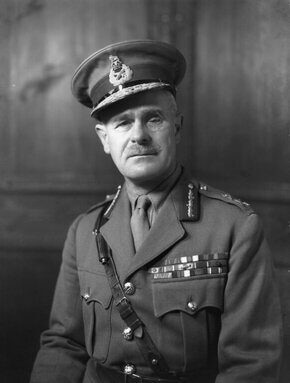
Hazrat Musleh-e-Maud’sra call for peace and India’s freedom
During his Friday Sermon on 22 June 1945, Hazrat Mirza Bashiruddin Mahmud Ahmad, Khalifatul Masih IIra shed light on the background of this development and gave valuable guidance to the Indian leaders.
In the beginning, Huzoorra said:
“About five and a half months ago I gave a khutba [on 12 January 1945] from this very place in which I sought to impress upon Great Britain and India that they should arrive at an amicable settlement of their long-standing differences without further loss of time for the Divine Scheme about the world’s future embraced portentous upheavals of which the consequences, otherwise, were going to be full of deadly perils for both. God in His grace and mercy has vouchsafed to me a knowledge of these upheavals not only in broad outline but He has enlightened me on some points of detail as well. […]
“God in His grace sometimes makes the tongue of His servant an instrument for the expression of His own will and pleasure. When I gave this khutba no one imagined that any possibility of an understanding between Great Britain and India was near hand. […]
“Lord Wavell, the Viceroy, was generally understood to be opposed to the Indian demands. When Sir Stafford Cripps came on his famous mission [as head of the Cripps Mission in March 1942], Lord Wavell was Commander-in-Chief in India, and failure of the Cripps mission, in the popular view, was due mainly to his opposition to Indian aspirations. The present Viceroy was therefore one of those influential Britons who, rightly or wrongly, were generally supposed to hold views unfavourable to the Indian demands.
“During the regime of such a Viceroy, and at a time when it was the general impression in this country that the question of granting Independence to India had for the time being ceased to occupy the minds of British statesmen as a pressing problem of practicable politics, I was moved by God to invite Great Britain and India to compose their differences.” (The Review of Religions, Vol. 44, pp. 103-104, July 1945)
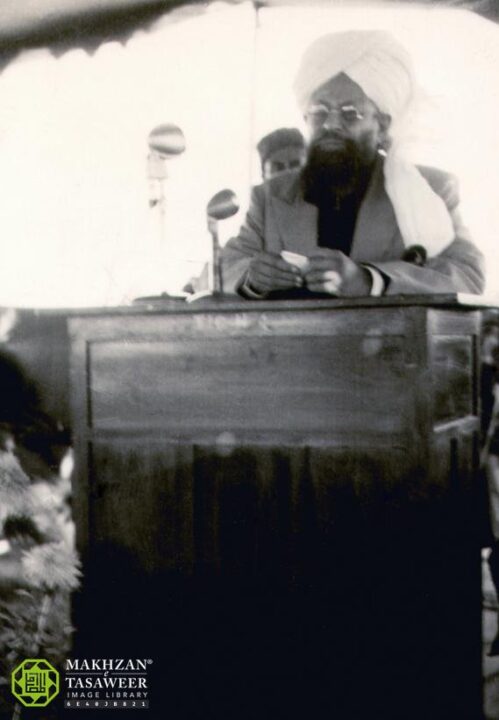
During the above-mentioned Friday Sermon, dated 12 January 1945, Huzoorra said:
“It is time for England to forget the old disputes with countries under the British Empire, especially India, in order to enhance relations and reconcile with them. In addition, they both should make a collective effort for strengthening the foundations of future progress and peace in the world. […]
“I deem it necessary to advise England, no matter if my advice is lost in the air. Now, such inventions have been made that even catch voices from thin air; the radio is an instrument which catches voices from the air – so, how can I fear my voice being lost in the air? It is possible Allah the Almighty conveys my call – which has been lost in the air – to the ears of the people. Therefore, I advise England:
“‘O England! Your benefit is in conciliation with India. God Almighty desires that you both cooperate with each other and establish peace and true freedom in the world.’” (Al Fazl, 17 January 1945, p. 2)
Huzoorra continued his Friday Sermon of 22 June 1945, by saying:
“I had mentioned in this khutba that I well knew my voice was only the voice of the leader of a small group of no great political importance. But I had added that I knew with even greater and fuller conviction that behind the material phenomena around us there was the Hand of a Living God Who had the power, if He so willed, to make my voice carry far, and to invest it with a compelling weight. This khutba exists in print. It has been widely studied by friends and foes alike. In England, a translation was sent by our missionary [Hazrat Maulana Jalaluddin Shamsra] in London to most members of the Parliament, many of whom wrote back to him expressing appreciation. Some of these letters have been printed in the Al Fazl [of 9 June 1945].” (The Review of Religions, Vol. 44, pp. 104-105, July 1945)
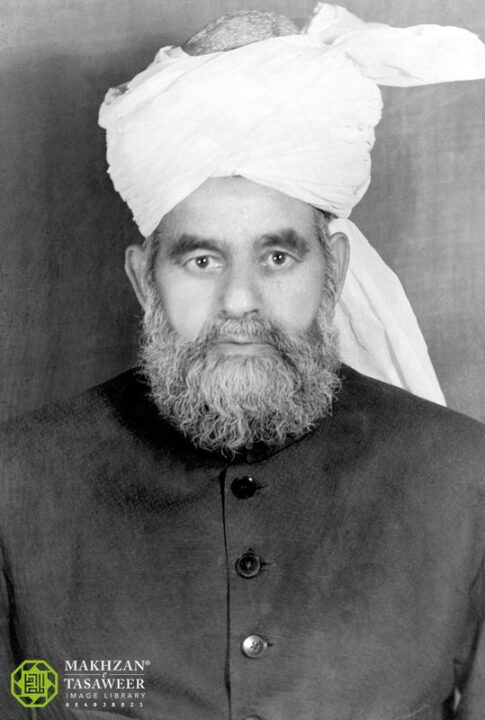
The Times of London, dated 10 March 1945, published a letter from Hazrat Maulana Jalaluddin Shamsra in which he stated:
“With regard to Sir M. Zafrulla Khan’s suggestion, supported by a number of letters, that an immediate step should be taken to solve the deadlock in India resulting from the failure of the Cripps mission. I should like to state that the Head of the Ahmadiyya Movement, under whose guidance the whole community is helping the Government, by all possible means, in the prosecution of the war, in his address on January 12, expressed the same view.
“He said that it was of paramount importance in view of the future interests of both countries, that Great Britain and India should reconcile their views and bind themselves with an unbreakable tie of friendship.
“Yours faithfully,
“JD Shams, Imam of The London Mosque.
“63, Melrose Road, S.W.18, March 7.” (The Times, 10 March 1945, p. 5)
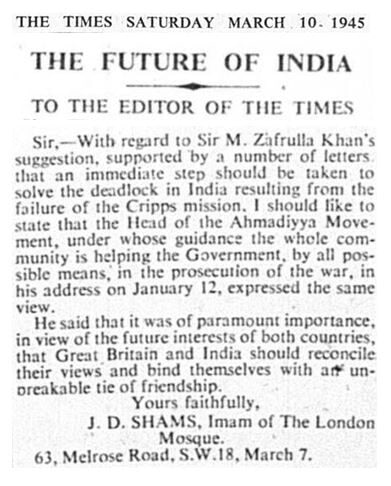
Huzoorra continued his Friday Sermon by saying:
“Following this khutba, the Hand of God set in motion a chain of incidents which conspired to force the point raised by me to the forefront as a vital, clear-cut issue of the utmost urgency which brooked no more temporising. Sir Mohammad Zafrullah Khan was sent by the Government of India to attend a Commonwealth [Relations] Conference [in February-March 1945] in London.
“While on this mission, Sir Mohammad [Zafrulla Khan] in a speech raised the question of the Independence of India, placing before the British public the purport, in his own words, of my khutba of January 12.
“Sir Mohammad [Zafrulla Khan] knew that he was in London as a nominee and a representative of the Government of India; but some extraordinary patriotic impulse drove him to forget it for the moment and unceremoniously jump into the arena as a disconcerting champion of the forlorn Indian cause.
“Further, it should be noted, that people of a status higher than that of Sir Mohammad [Zafrulla Khan] often go to England where they make important speeches in various connections, without causing little more than a surface ripple or two. But Sir Mohammad [Zafrulla Khan’s] advocacy of the Indian cause sank deep and went home, giving rise to a prolonged echo and thoughtful repercussions in the press, even far across the seas in America and India.” (The Review of Religions, Vol. 44, p. 105, July 1945)
Hazrat Sir Zafrulla Khan Sahib’sra speech at the Commonwealth Relations Conference
On 17 February 1945, Hazrat Sir Chaudhry Muhammad Zafrulla Khanra delivered a speech during the 1945 Commonwealth Relations Conference, about which he himself states:
“I made a strong appeal to the assembled statesmen of the Empire that India should, as soon as possible, become independent. […] About a couple of hours later, we found that that part of my speech had been printed verbatim in bold letters in the evening papers. That created a great stir.” (The Reminiscences of Sir Muhammad Zafrulla Khan, p. 137)
During his speech, he said:
“India is on the March. You may help her or you may hinder her but none shall stop her. India shall be free, within the Commonwealth, if you will let her and accord her the position which is her due, but without the Commonwealth if you leave her no alternative.” (The Indian Annual Register, July-December 1945, Vol. II, p. 77)
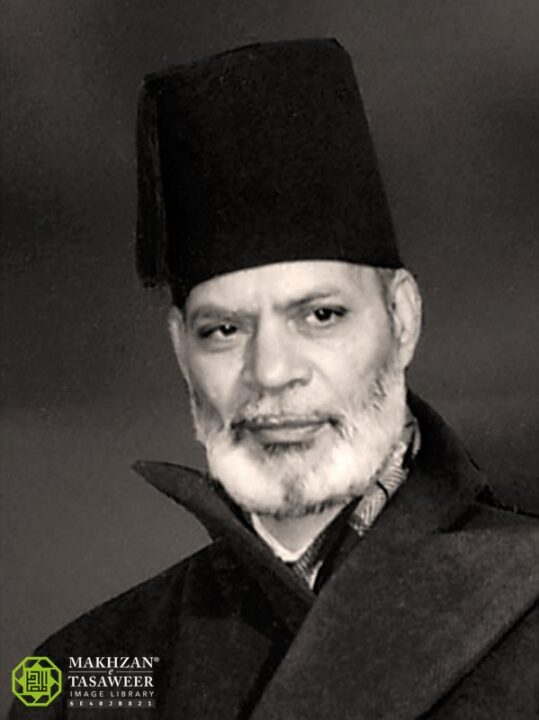
Sir Zafrulla Khanra also delivered a speech at a banquet held on the same evening in honour of the members of that conference. He recalls that in that speech, he appealed to the British government to do something positive and concrete in regard to the issue of India, and within a day or two, he “was told that as the result of those two speeches Lord Wavell, who was then Viceroy of India, had been summoned for consultations to London.” (The Reminiscences of Sir Muhammad Zafrulla Khan, pp. 137-138)
On 8 March 1945 – in the British parliament – Mr Creech Jones had asked the Secretary of State for India to make a statement in view of the recent speech by Sir Zafrulla Khan to the Commonwealth Conference regarding the approach by His Majesty’s Government to the Indian situation. The Secretary of State for India, Mr Amery responded by saying that the fulfilment of His Majesty’s Government’s policy “depends on a common measure of agreement between the principal parties which His Majesty’s Government sincerely wish to see attained.” (Hansard, HC Deb 8 March 1945, Vol. 408, https://hansard.parliament.uk/Commons)
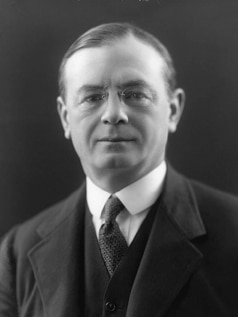
This was followed by a comment by Mr Shinwell that:
“In view of the conciliatory speeches made recently by Sir Zafrulla Khan and other moderate Indian leaders on this subject, which seems to indicate a new line of approach to a solution of this problem, and, as it is necessary that somebody must take the initiative, is it not desirable that His Majesty’s Government should make a friendly gesture in the hope of effecting a rapprochement.” (Ibid)
The Times reported:
“Careful and early examination is required to determine whether Britain’s initial action should take the form of the declaration suggested recently by SIR MUHAMMAD ZAFRULLA KHAN; of an all-parties conference summoned by LORD WAVELL to discuss the improvement of the procedure suggested in the Cripps offer; of a technical exploratory committee to examine the questions involved in the conclusion of the Indo-British Treaty; or of any of the other suggestions from time to time put forward by those anxious to promote a better understanding between the two countries. […] Every step which is taken must be designed as a stage in a logical series planned from first to last to evoke and permit the constructive cooperation of Indian opinion. An isolated ‘gesture’, unrelated to the ultimate goal, will lead nowhere.” (The Times, 10 March 1945, p. 5)
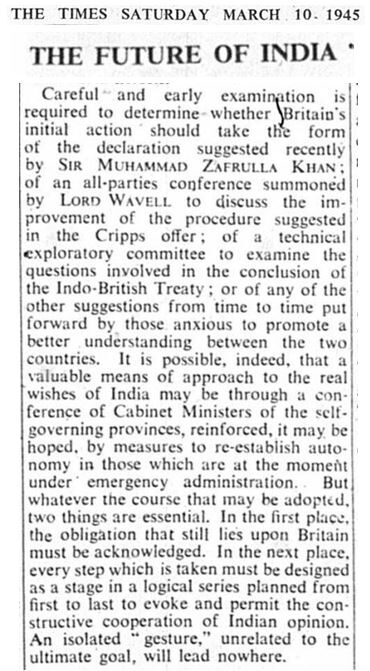
Hazrat Musleh-e-Maudra continued his Friday Sermon by saying:
“And so, it came to pass; my prophetic words were fulfilled that I had no fear of my voice being lost upon the air. As I had said, like radio waves, it sped across physical and mental spaces, rousing compelling echoes in far-off USA on one side, and on the other in hearts as distantly placed from its proper grasp on account of their mental make-up.
“But the voice I had raised yet suffered from one important drawback. For the completion of its purpose was needed a man devoted to this view, with power enough in his hands to influence the pattern of coming events. And for this purpose the Hand of God singled out a man whom popular opinion did not credit with any great sympathy for India or any deep interest in her problems. Rather he was considered to be the main cause responsible for the failure of the Cripps mission […] Lord Wavell, the present Viceroy.
“Is it not curious that little more than a couple of months after my speech the heart of this strong silent man [Lord Wavell] was so gripped by the sentiments I had expressed in my khutba that he flew to London to woo the British Cabinet into the belief that the hour had struck when Independence must be extended to India.
“The Press has moreover borne witness to the hard fight the Viceroy found necessary to make his point of view prevail. It was even reported, more than once, that if his plan was turned down he would resign: for about six weeks the air was thick with rumours of this kind. Some members of the Cabinet were accused of opposition to the Wavell plan; and it appears beyond doubt that Lord Wavell would have returned at all but resigned, if extraordinary forces had not been ranged in support of his demand by the invisible hand of God.” (The Review of Religions, Vol. 44, pp. 105-106, July 1945)
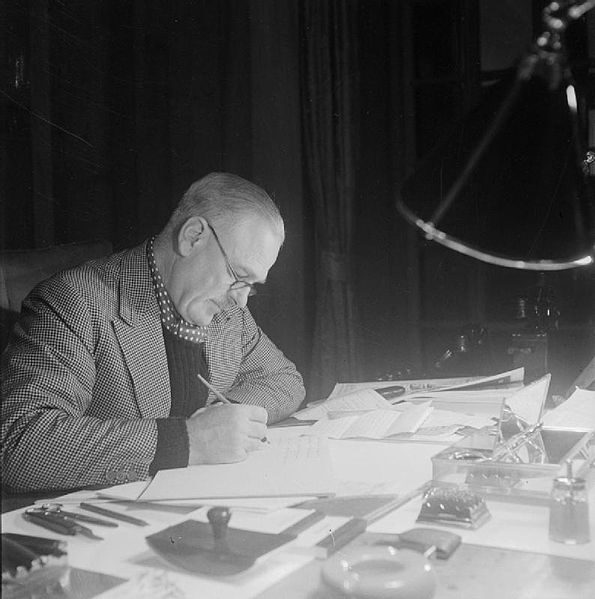
Lord Wavell arrives in England
After reaching England on 23 March 1945, Lord Wavell had his first meeting on 26 March with the Cabinet Committee on India, and later with Prime Minister Sir Winston Churchill on 29 March, where he said “quite firmly that India was very urgent and very important”, and that he “could see no reason to postpone the issue”, but the prime minister insisted on delaying the matters related to India. (Wavell: The Viceroy’s Journal, by Penderel Moon, Oxford University Press, pp. 118-120)
This was followed by several meetings with the Cabinet Committee on India. Lord Wavell’s proposed plans for India were receiving negative responses from the Committee and even he was left out of many meetings. He said that “they find my presence troublesome apparently and prefer to come to decisions without me.” (Ibid, p. 126)
While expressing his disappointment for not getting any breakthrough after several meetings, he stated “I feel I have failed to make HMG realise the importance and urgency of the Indian problem or the real facts of the position. […] The matter could have been settled in a week if they had really taken it seriously and wanted to.” (Ibid, p. 127)
In his sermon, Hazrat Musleh-e-Maudra said:
“While the Viceroy’s talks with members of the Cabinet appeared to be bearing little fruit, the Labour Party gave notice of its intention to withdraw from the coalition, which made Mr Churchill decide in favour of an immediate election, although with the conservative majority in the House at his back he could have carried on for some time.” (The Review of Religions, Vol. 44, p. 106, July 1945)
Resignation of Mr Churchill
On 23 May 1945, when Sir Winston Churchill’s government resigned, King George VI had asked him to form a caretaker government and thus he started working as a caretaker prime minister.
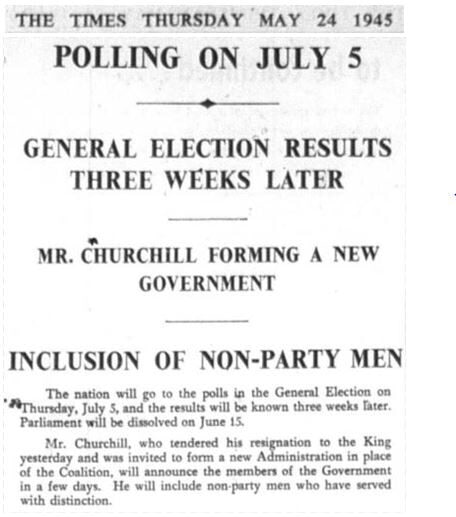
On that day, Lord Wavell stated that “he was still, however, hopeful of getting a solution next week”. He even wrote a letter to Sir Winston Churchill on 24 May to point out that he “had nothing from India Committee for 4 weeks or from himself for 7 weeks and asking for a decision”. In response, Anthony Eden conveyed to him that the prime minister “was going to agree to the proposed draft statement in Parliament and that now the question of dates arose as the statement would have to be made before Parliament dissolved on June 15.” (Wavell: The Viceroy’s Journal, by Penderel Moon, Oxford University Press, p. 131)
Huzoorra said:
“With this decision from the Premier [to call the general elections] the country was at once gripped by an election fever which led certain Labour leaders to refer to India as if they intended to make it an election issue, more or less, and were planning to exploit in their own interests the liberal tendency discernible in the country on the question of granting Independence to India.
“With the Labour Party threatening to give this disturbing twist to the Indian question, the Conservative members of the Cabinet, who for the most part had not been very enthusiastic about the announcement of the Wavell plan, were forced to change their attitude, to take the wind out of Labour sails, if for nothing else. These developments effectively strengthened Lord Wavell’s hand, and the difficulties which had baffled him for six weeks now suddenly yielded to his touch in little more than a couple of days; and he returned to India to announce the new plan.” (The Review of Religions, Vol. 44, pp. 106-107, July 1945)
Wavell Plan announced
On 14 June 1945, the Secretary of State for India, Mr Amery stated in the parliament:
“May I take the opportunity of reading to the House a statement which I have been authorised by his Majesty’s Government to make on the subject of India, and which is being published at the same time in India? The statement is in the form of a White Paper, and is now available in the Vote Office. It says:
“‘During the recent visit of Field-Marshal Viscount Wavell to this country His Majesty’s Government reviewed with him a number of problems and discussed particularly the present political situation in India.
“‘Members will be aware that since the offer by His Majesty’s Government to India in March, 1942, there has been no further progress towards the solution of the Indian constitutional problem.
“‘As was then stated, the working out of India’s new constitutional system is a task which can only be carried through by the Indian peoples themselves.
“‘While His Majesty’s Government is at all times most anxious to do their utmost to assist the Indians in the working out of a new constitutional settlement, it would be a contradiction in terms to speak of the imposition by this country of self-governing institutions upon an unwilling India. Such a thing is not possible, nor could we accept the responsibility for enforcing such institutions at the very time when we were, by its purpose, withdrawing from all control of British Indian affairs.
“‘The main constitutional position remains therefore as it was. The offer of March, 1942, stands in its entirety without change or qualification. His Majesty’s Government still hope that the political leaders in India may be able to come to an agreement as to the procedure whereby India’s permanent future form of government can be determined.’” (HC Deb., 14 June 1945, Vol. 411, cc1831-73, https://api.parliament.uk)
Lord Wavell noted:
“And so is launched a fresh attempt to help India to political freedom, which I initiated with a note to HMG just 9 months ago. I suppose it is something of an achievement to have got it thus far, but whether it will crash on Indian intransigence, like the Cripps and other proposals, remains to be seen.” (Wavell: The Viceroy’s Journal, by Penderel Moon, Oxford University Press, p. 142)
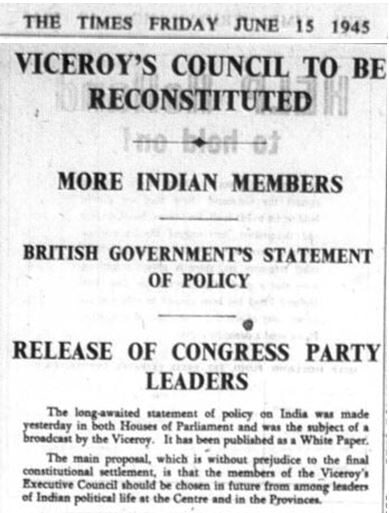
Hazrat Musleh-e-Maud’sra guidance to the Indian leaders
Huzoorra continued his Friday Sermon by saying:
“This is the momentous proposal now before India; and it is, to me, a proposal in consonance with the divine plan, for the fact is plain as daylight that it has been brought to the surface by an extraordinary combination of events and circumstances. It would therefore be a most unfortunate and dark day for India if her sons deliberately turn their backs upon such a proposal. I, for once, find it impossible to comprehend how Indian leaders, many of whom are men of calibre and deep vision, can fail to perceive that if they have every hope and confidence in their ability to win freedom, notwithstanding the fact that the entire power now lies in the hands of the Britisher, they should have no reasonable ground for misgivings after 90% of the power is transferred to them. […]
“There can be no possible shadow of doubt that whatever rights we do get, no matter whether they are large or small, it is emphatically in our interest to grasp them firmly and turn them to our advantage. By doing so we shall be bringing the day of India’s Independence nearer. I am firmly of [the] opinion that we should gladly accept this proposal. We should do so not for the sake of doing a good turn to Great Britain, but for the good of our own souls, and for the good of the coming generations of our children. […]
“If India ever is to accomplish anything really big, the people of this country must rid themselves first of this sense of slavery. It does not help us much if the Indian political leaders have already shed this sense, for it is the frame of mind of the people at large that counts in a crisis. […] Because we find a few political leaders behaving like free men, we should not at once hasten to assume that a sense of freedom is really a stir in the whole country. If we do so we shall only be letting our fond hopes run away with us, for the masses yet are far from feeling that surge of the soul which tempers character and personality like a blade of true steel.
“No amount of empty words, no amount of pious exhortations, no amount of fiery political speeches can set in motion this surge of the soul on a country wide scale. To awaken a real hunger for freedom, we must give the masses some fore-taste of the joys of freedom – which we can do most effectively only by firmly grasping the power, now being put into our hands.” (The Review of Religions, Vol. 44, pp. 107-110, July 1945)
The Civil and Military Gazette reported:
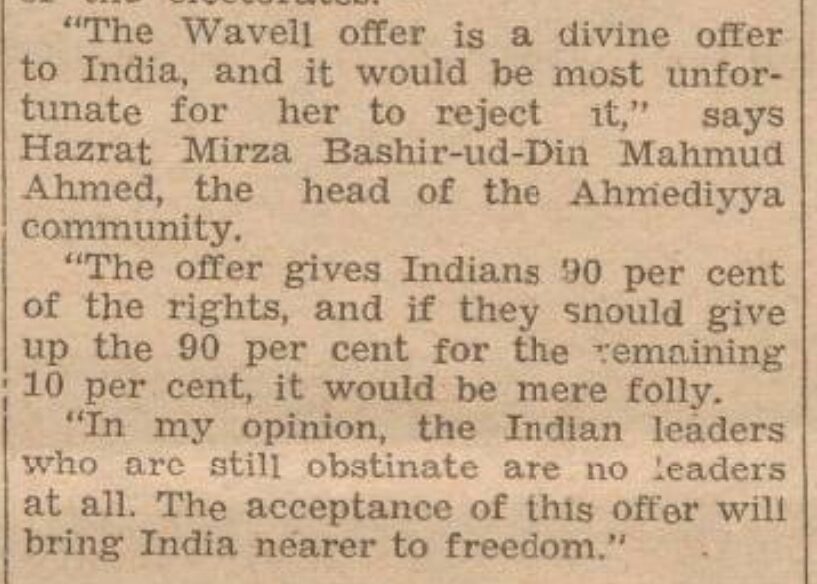
“‘The Wavell offer is a divine offer to India, and it would be most unfortunate for her to reject it,’ says Hazrat Mirza Bashir-ud-Din Mahmud Ahmed, the head of the Ahmediyya community.
“‘The offer gives Indians 90 percent of the rights, and if they should give up the 90 percent for the remaining 10 percent, it would be mere folly.
“‘In my opinion, the Indian leaders who are still obstinate are no leaders at all. The acceptance of this offer will bring India nearer to freedom.’” (The Civil and Military Gazette, 24 June 1945, p. 5)
Hazrat Musleh-e-Maud’sra advise to the Jamaat
While advising members of the Jamaat, Huzoorra said:
“This is a grave moment in the history of our country and I call upon members of the Ahmadiyya community in this crisis to turn to God in prayer that He may be pleased to endow the Indian leaders with true vision so that they should benefit to the full from the turn which the Hand of God has given to events following my khutba.
“For, should the Indian leaders miss this chance, they would condemn India to continue in chains for another fifty or a hundred years. They would thereby preserve their leadership intact, but they would deny to their country her rightful place in the comity of nations. […]
“We, the Ahmadis, are only a small group in India. Therefore we see these distressing signs but can do very little about it except stand looking on in helplessness. There is one thing, however, which we can do and that is to pray to God to open the eyes of the Indian leaders – Hindus, Muslims and all.
“A free India would not be an advantage to the Indians alone but to the cause of World Peace as well.” (The Review of Religions, Vol. 44, p. 112, July 1945)
The impact of Huzoor’s sermon
While commending Huzoor’s call for peace and India’s freedom, Maulvi Sanaullah Amritsari wrote:
“[In regard to India’s freedom] the point of view of the Khalifa of Qadian is also worth listening to. […] Whatever the Khalifa of Qadian has stated during his Friday Sermon [of 22 June 1945], while commenting on the government’s new scheme and the slavery of Indians, deserves to be read and heard. He has advised the leaders to act with unity. […] The passion to free 400 million Indians from slavery – which is evident from this speech of Khalifa Ji [Hazrat Khalifatul Masih IIra] – cannot be found even in the speech of Gandhi Ji.” (Ahl-i-Hadis of Amritsar, 6 July 1945, p. 4)
The original Urdu of this sermon was published in Al Fazl of 23 June 1945, whereas its original Urdu and English translations were given to various leaders in Simla, where they had convened for a conference upon the invitation of Lord Wavell for consultations on the Wavell Plan.
The leaders who were given the sermon’s Urdu and English text included Maulana Abul Kalam Azad, Quaid-e-Azam Muhammad Ali Jinnah, MK Gandhi, Khan Abdul Jabbar Khan, Mr Hussain Imam, Mian Iftikharuddin, Pandit Govind Ballabh Pant, Rajkumari Amrit Kaur, BG Kher, Ravishankar Shukla, Sri Krishan Sinha, etc. (Al Fazl, 27 and 28 June 1945)
England’s general election
The Labour Party quit from the coalition, Churchill’s call for the general election and the Wavell Plan; all of these incidents were interconnected, thus it is important to mention England’s general elections held on 5 July 1945 and won by the Labour Party.
The Guardian stated on 14 March 2001:
“With hindsight it was a blessing for Britain, as well as for its vast numbers of subjects around the world, that Winston Churchill lost the 1945 election. […] His antipathy to India’s independence struggle, in particular, was well established.
“Attlee, on the other hand, recognised that the British Raj was doomed. He had been to Haileybury College, after all, and had paid an official visit to India in 1929. Even if the prime minister had harboured any illusions about Britain’s duty to its 300m Indian subjects, he was constantly reminded by Washington that the US would not tolerate the continuance of empire. Wisely, he bowed to the inevitable, and prepared for withdrawal.” (“1945-51: Labour and the creation of the welfare state”, www.theguardian.com, accessed 14 June 2022)
Related Content
- Hazrat Musleh-e-Maud’s services to the Muslim cause: Guiding Muslims of the Indian subcontinent amid religious and political conflicts
- Hazrat Musleh-e-Maud’s response to the Shuddhi movement and the Jamaat’s relentless services for Islam
- The Simon Commission, First Round Table Conference and Hazrat Musleh-e-Maud’s valuable guidance
- Freedom is the birthright of everyone: Hazrat Musleh-e-Maud’s guidance regarding India’s independence and partition
- The Simla Conference, 1945: Hazrat Mirza Bashiruddin Mahmud Ahmad’s (ra) guidance prior to the conference and response to its failure
- The Cabinet Mission, 1946: Its background and Hazrat Mirza Bashiruddin Mahmud Ahmad’s (ra) guidance
- The deadlock over Interim Government and Constituent Assembly for India: Its background and Hazrat Mirza Bashiruddin Mahmud Ahmad’s (ra) guidance
- May India and Pakistan live amicably: The Partition of India, 1947 and Hazrat Mirza Bashiruddin Mahmud Ahmad’s heartfelt wish

